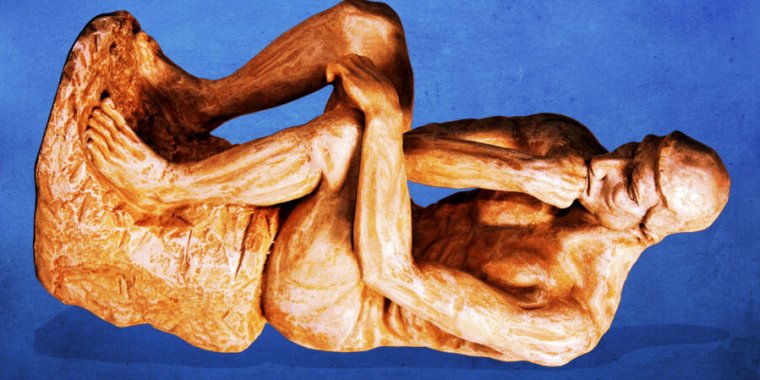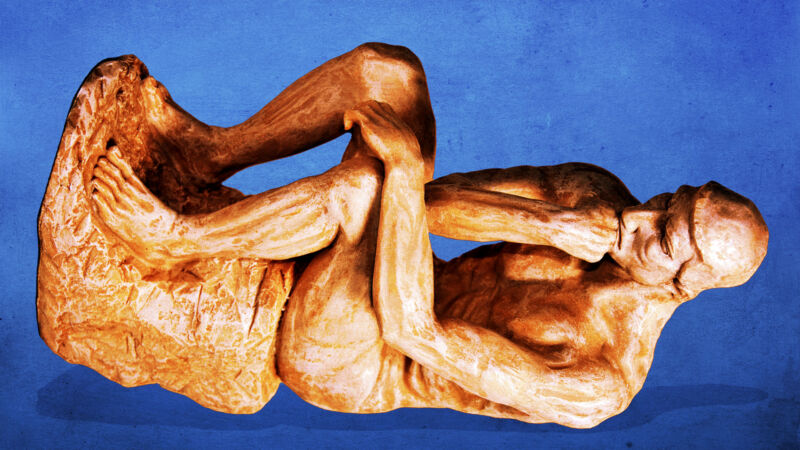

Aurich Lawson / Getty Photos
Interested by why geologists lick rocks or what number of nostril hairs there are on a human cadaver? Maybe you want a snazzy lifeless wolf spider to make use of as a biodegradable robotic gripper? How a few “sensible rest room” that analyzes your urine stream and fecal deposits whereas taking an image of your anus for good measure? These and different uncommon analysis endeavors have been honored tonight in a digital ceremony to announce the 2022 recipients of the annual Ig Nobel Prizes. Sure, it is that point of yr once more, when the intense and the foolish converge—for science.
Established in 1991, the Ig Nobels are a good-natured parody of the Nobel Prizes; they honor “achievements that first make folks giggle after which make them suppose.” The unapologetically campy awards ceremony options miniature operas, scientific demos, and the 24/7 lectures whereby consultants should clarify their work twice: as soon as in 24 seconds and the second in simply seven phrases. Acceptance speeches are restricted to 60 seconds. And because the motto implies, the analysis being honored might sound ridiculous at first look, however that does not imply it is devoid of scientific benefit.
Viewers can tune in for the same old 24/7 lectures, in addition to the premiere of a “non-opera” that includes numerous songs about water, consistent with the night’s theme. Within the weeks following the ceremony, the winners will even give free public talks, which might be posted on the Inconceivable Analysis web site.
With out additional ado, listed here are the winners of the 2023 Ig Nobel prizes.
Chemistry/Geology Prize
Quotation: “Jan Zalasiewicz, for explaining why many scientists wish to lick rocks.”
Anybody who is aware of a geologist or paleontologist has possible discovered of a peculiar behavior: licking rocks. These scientists will let you know that it is a fairly good solution to take a look at if a rock is a rock or a bit of fossilized bone for the reason that latter will persist with the tongue, and grinding mentioned rock between the tooth for a second can assist confirm the scale of the grains—and thus whether or not the rock accommodates clay or silt. Zalasiewicz is a paleontologist on the College of Leicester within the UK, and he addressed the colourful historical past of the rock-licking apply, amongst different peculiarities, in an entertaining 2017 essay printed in The Paleontological Affiliation Publication.
“Wetting the floor permits fossil and mineral textures to face out sharply slightly than being misplaced within the blur of intersecting micro-reflections and micro-refractions that come out of a dry floor,” Zalasiewicz wrote, recalling the time he licked a roadside rock that turned out to be a well-preserved Nummulites foraminifera. In response to Zalasiewicz, this “style for stratigraphy” would possibly date again to an 18th-century mining engineer, surveyor, and self-professed mineralogist named Giovanni Arduino, who got here up with classes for strata that finally morphed into right now’s Geological Time Scale.
Arduino wrote a letter to Antonio Vallisneri, a professor on the College of Padua, by which he describes all of the native rocks, minerals, and fossils within the valley of the Agno, together with useful tasting notes. For instance, burnt fossil shells and bits of coal are “equally bitter and urinous.” Water from springs flowing out of a stratum wealthy in marcasite and coal “have an acid spicy taste” that Arduino likened to “the acidity of wine.” One likes to suppose that Arduino can be happy to study that his “taxonomy of style” stays a standard analytical instrument amongst modern-day rock lovers.
Literature Prize
Quotation: “Chris Moulin, Nicole Bell, Merita Turunen, Arina Baharin, and Akira O’Connor, for learning the sensations folks really feel after they repeat a single phrase many, many, many, many, many, many, many instances.”
Most of us are conversant in the phenomenon of déjà vu: the sense that we have skilled one thing earlier than, though we’ve not—an phantasm of reminiscence, if you’ll. The alternative of that’s jamais vu, a fleeting sensation of novelty or unfamiliarity regarding one thing we have now seen or skilled earlier than: normally a phrase, however typically additionally folks or locations. Jamais vu is usually a symptom of epilepsy or migraine. Moulin et al. had a hunch that jamais vu might be produced with so-called phrase alienation duties and got down to take a look at that speculation, conducting experiments with scholar volunteers from the College of Leeds.
The research contributors dutifully copied the identical collection of phrases time and again (and over) and have been informed to cease in the event that they began feeling “peculiar,” which normally occurred (in two-thirds of the contributors) after 30 repetitions, or about one minute—the purpose of “semantic satiation.” As an illustration, there have been sensations of phrases shedding their which means the extra one checked out them (“They simply appear to be a string of letters as a substitute of an entire phrase”), or a well-recognized phrase instantly appeared unusual (“It would not appear proper, nearly appears to be like prefer it’s probably not a phrase however somebody’s tricked me into considering it’s”). Those that reported experiencing déjà vu of their day by day lives have been more likely to report experiencing jamais vu, suggesting a correlation between the 2.